-
Kutchina service center, Kolkata - 700010
Kutchina service center, Kolkata - 700010
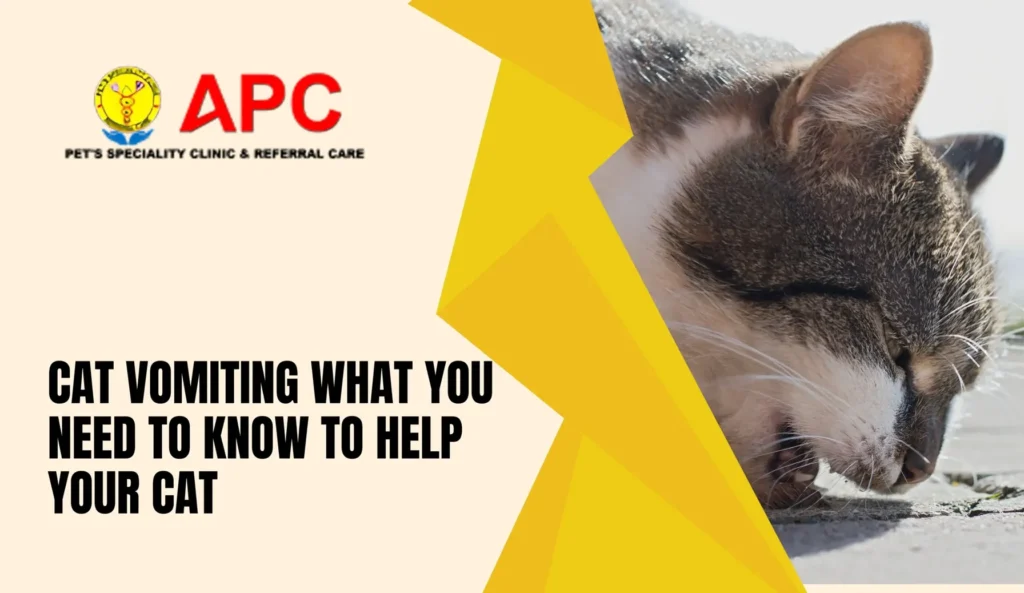
Hello Reader!
Welcome to the blog page of APC Pet Clinic, one of the best pet clinic in Kolkata.
Cats are known for their graceful movements and meticulous grooming habits, but if you’re a cat parent, you’ve probably faced a worrying sight – your furry friend suddenly throwing up. Cat Vomiting can be alarming, especially if it happens frequently. At APC Pet Clinic, the best pet clinic in Kolkata, we believe that understanding the causes, symptoms, and solutions is the first step to keeping your feline healthy.

Cat Vomiting can occur for many reasons, ranging from something minor to serious health issues. Some common causes include:
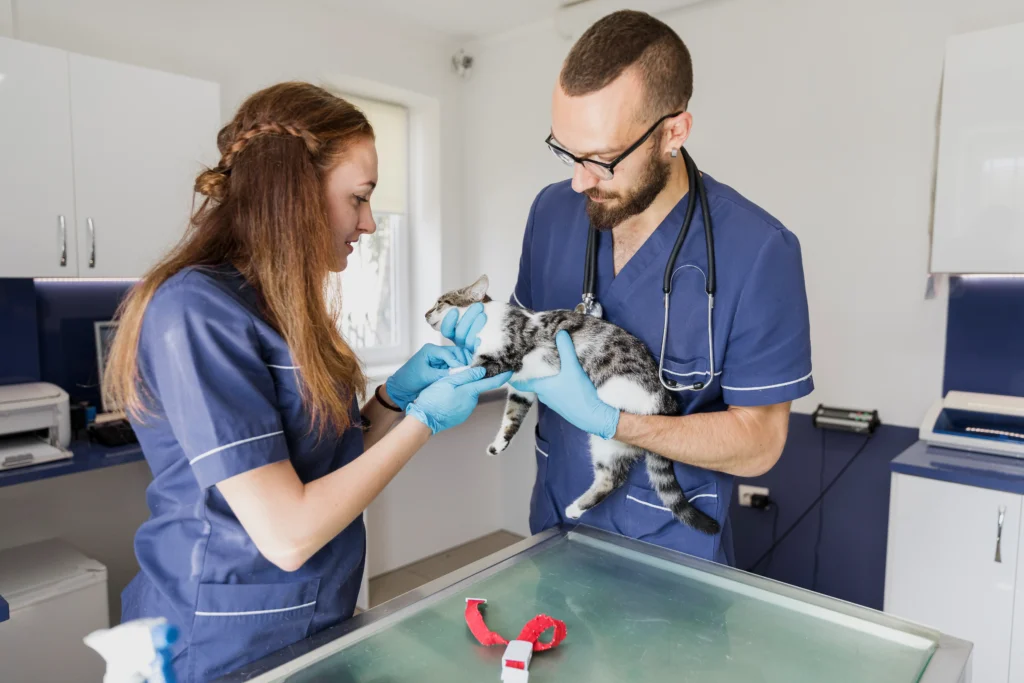
While an occasional vomit may not be cause for alarm, there are situations when you should visit the best pet clinic in Kolkata immediately:
At APC Pet Clinic, we perform thorough examinations and, if necessary, diagnostic tests such as blood work, X-rays, or ultrasounds to determine the exact cause of Cat Vomiting.
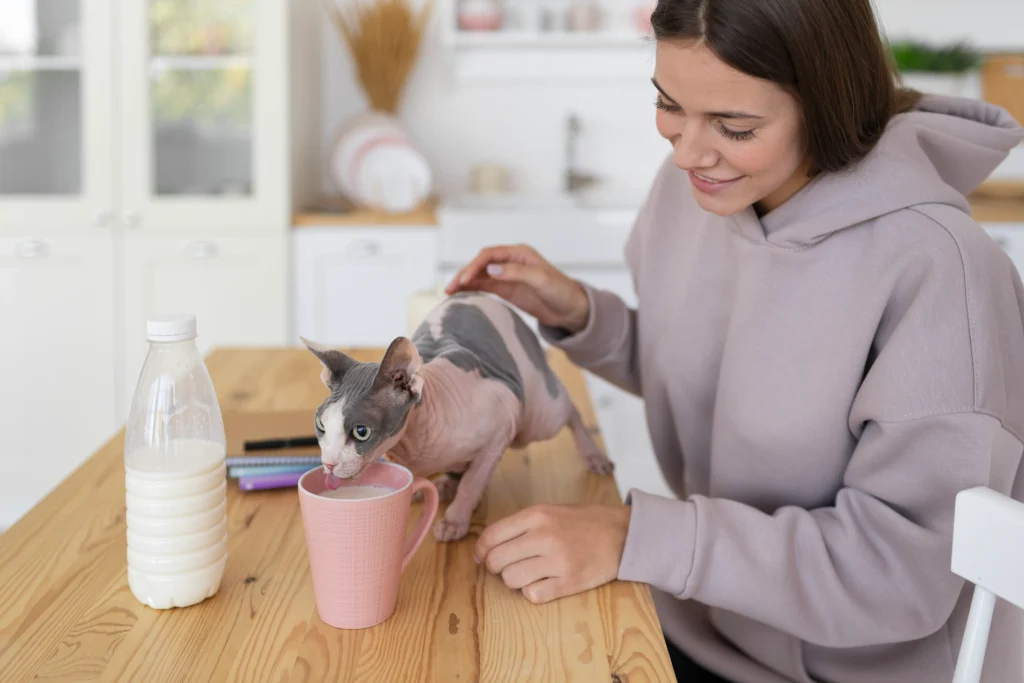
If your cat vomits occasionally but seems otherwise fine, you can take some simple steps:
However, remember that home remedies are only for mild cases. Persistent or severe Cat Vomiting needs immediate attention from the best pet clinic in Kolkata to prevent complications.
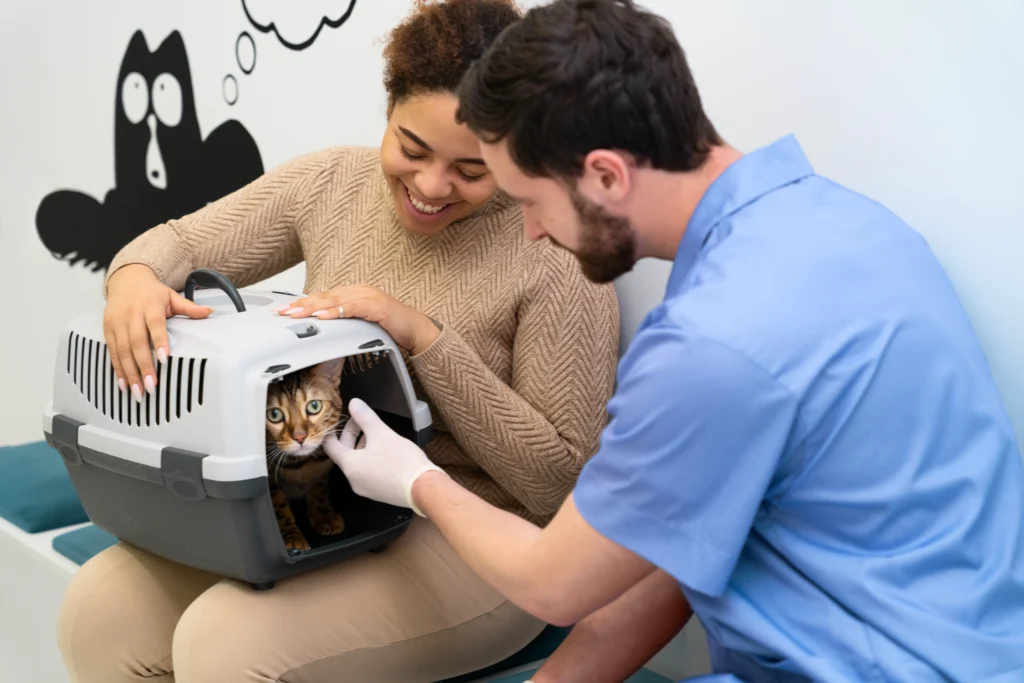
At APC Pet Clinic, our team of experienced veterinarians uses a combination of advanced diagnostic tools and personalized care plans to treat Cat Vomiting effectively. Depending on the diagnosis, treatments may include:
Our goal is not just to stop the vomiting but to address the root cause so your cat can return to optimal health.
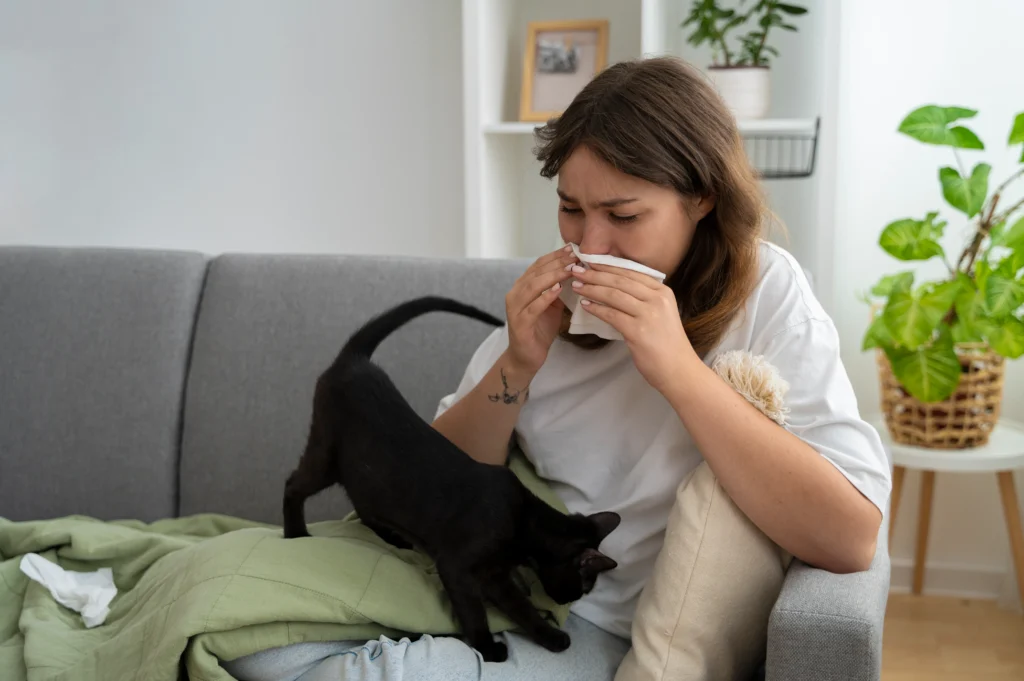
Prevention is always better than a cure. Here’s how you can minimize the chances of Cat Vomiting:
Here are the most common causes of cat vomiting you should watch for in your cat:
Cats groom themselves and can swallow loose hair, which accumulates and leads to vomiting up hairballs. This is typical, but frequent hairballs may signal a gastrointestinal issue.
Abruptly changing your cat’s food or giving large portions can upset their digestive system and cause vomiting. Always switch foods gradually over several days.
Allergies to proteins (fish, beef, chicken, dairy) or intolerance to food ingredients may trigger vomiting, often along with diarrhea or skin problems.
Cats may ingest household plants, chemicals, or indigestible items like elastic bands, hair ties, or string, leading to stomach irritation, poisoning, or even intestinal blockage and vomiting. This can require immediate attention.
Various viral, bacterial, and fungal infections can cause vomiting, especially in outdoor or unneutered cats.
Intestinal parasites like roundworms are more common in kittens but can affect cats of any age, causing vomiting and sometimes visible worms in the vomit.
Chronic illnesses such as hyperthyroidism, diabetes, kidney disease, liver disease, pancreatitis, and cancer may lead to vomiting as one of their symptoms.
Inflammation of the gut leads to chronic vomiting, as the digestive system can’t absorb nutrients properly.
Older, dehydrated cats or those with pelvic injuries can develop severe constipation, resulting in vomiting.
Certain drugs (chemotherapy, antibiotics, anti-inflammatories) and toxins (like lilies, antifreeze) may cause vomiting if ingested.
Also Read: Pet Grooming Essentials: DIY Tips and Professional Services
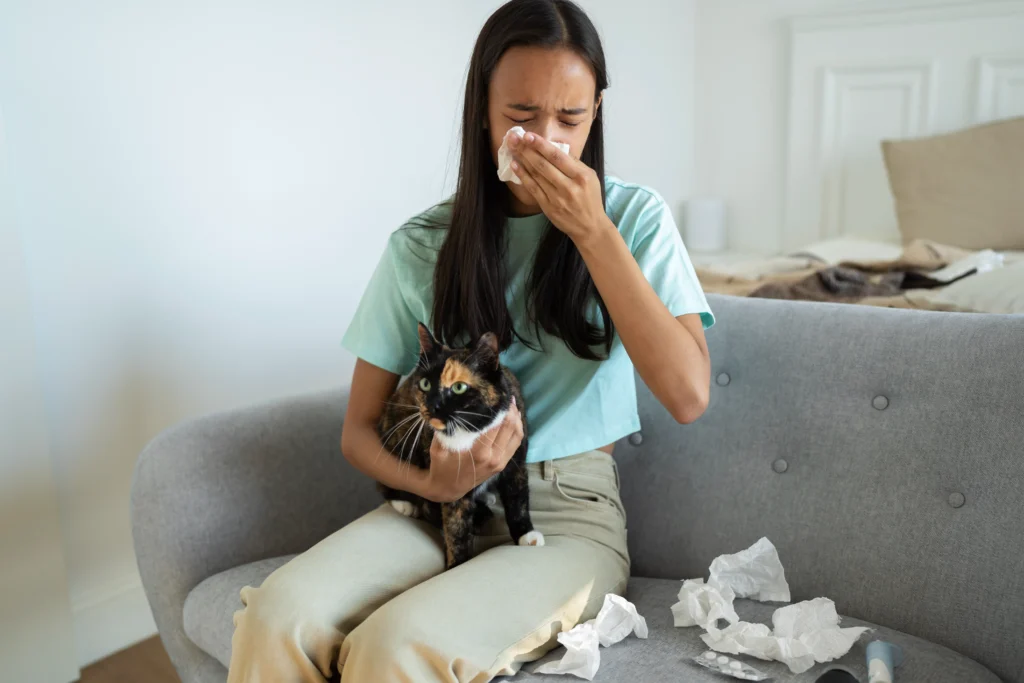
To differentiate between normal and emergency cat vomiting, here are key points to consider:
You should seek emergency veterinary care immediately if your cat exhibits any of these signs:
To help manage cat vomiting at home, here are some effective remedies and dietary changes you can try:
Withhold food for 12 to 24 hours to give your cat’s stomach a rest. Ensure fresh water is always available to prevent dehydration. After fasting, reintroduce food gradually.
Offer easily digestible foods such as boiled chicken (without skin or seasoning) and plain white rice. These gentle foods can soothe your cat’s stomach and reduce vomiting. Continue this diet for a few days before slowly transitioning back to regular food.
Instead of two large meals, feed your cat smaller portions multiple times a day. This prevents their stomach from becoming overwhelmed and reduces vomiting episodes.
Adding pet-safe probiotics to the diet can help maintain healthy gut flora and improve digestion, potentially reducing vomiting caused by digestive imbalances.
Make sure your cat has constant access to fresh water. You can encourage drinking by offering water mixed with a bit of tuna juice or electrolyte solutions designed for pets if hydration is an issue.
Regular grooming helps reduce hair ingestion, which can cause vomiting hairballs. You can also use hairball remedies like petroleum jelly or mineral oil (consult your vet before use).
Mild herbal options like ginger tea or chamomile tea can have stomach-soothing effects, but always consult your vet before giving herbal remedies to your cat.
Create a calm, stable environment to minimize stress, as anxiety can also contribute to vomiting.
Avoid administering any medications or treatments without consulting a veterinarian. If vomiting persists, worsens, or is accompanied by other symptoms, seek prompt veterinary care.
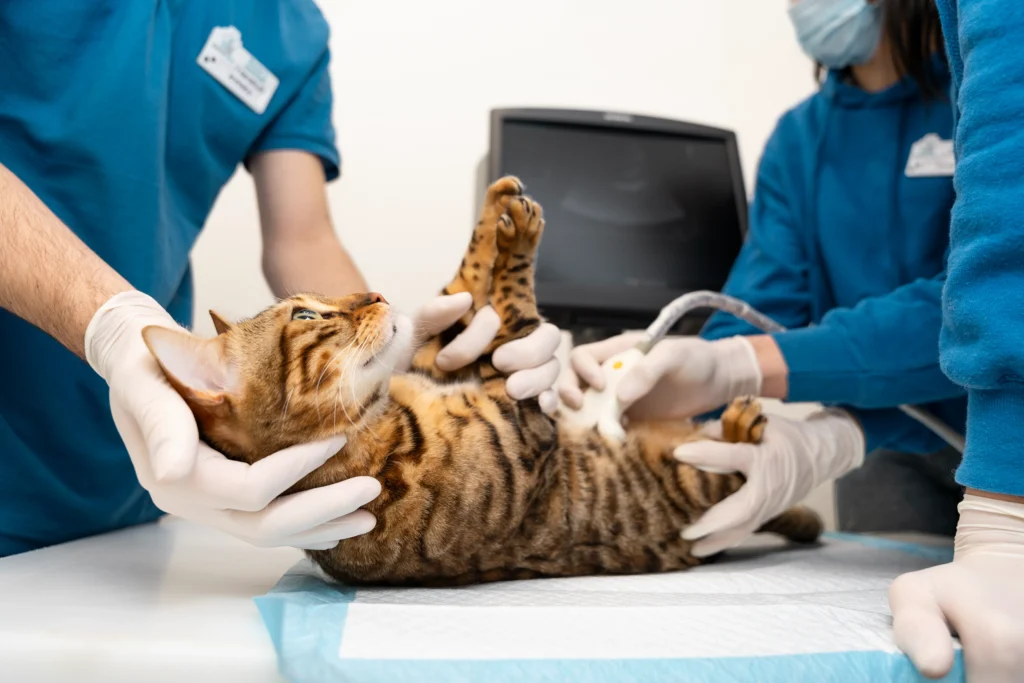
You should visit the best pet clinic in Kolkata, such as APC Pet Clinic, for your cat’s vomiting issue if you observe any of the following warning signs:
If vomiting occurs occasionally without other symptoms and your cat is otherwise normal (active, eating, drinking), you may monitor at home initially. However, persistent, severe, or worsening symptoms require prompt veterinary attention.
At APC Pet Clinic, the best pet clinic in Kolkata, they provide expert diagnosis and care for cats with vomiting, including emergency services when needed. Calling ahead to describe symptoms can help them prepare for your cat’s visit.
The specific symptoms indicating that your cat needs urgent veterinary care in Kolkata (such as at the best pet clinics like APC Pet Clinic) include:
If you observe any of these signs in your cat, you should seek emergency veterinary care immediately. In Kolkata, specialized clinics offering 24/7 emergency services provide diagnostics like X-rays, ultrasounds, blood tests, and advanced care to manage such critical conditions promptly.

Cat vomiting can be caused by hairballs, dietary changes, food allergies, infections, parasites, or underlying health issues like kidney or liver disease.
If your cat vomits more than once in 24 hours, has blood in the vomit, or shows signs of weakness, loss of appetite, or dehydration, visit the vet immediately.
Yes, hairballs are one of the most common reasons for occasional cat vomiting, especially in long-haired breeds.
Provide fresh water, feed easily digestible food, slow down feeding, groom your cat regularly, and monitor symptoms closely.
Feed a balanced diet, avoid sudden food changes, keep harmful substances away, and schedule regular vet check-ups.
Cat Vomiting can range from a minor, temporary issue to a sign of a serious health condition. As a responsible pet parent, it’s important to monitor your cat closely and seek veterinary care when needed. At APC Pet Clinic, the best pet clinic in Kolkata, we are dedicated to ensuring your cat’s health and comfort with compassionate, expert care.